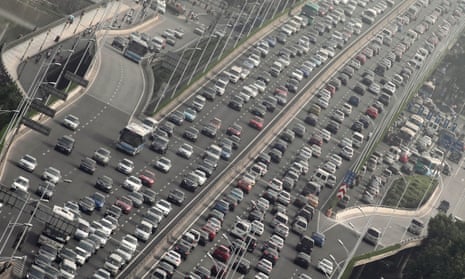The world can enjoy higher standards of living and more travel, while drastically cutting emissions to avoid dangerous climate change – but only with sweeping changes to our infrastructure, the natural world and agriculture, a new analysis has found.
The UK government analysis also assumes that billions of people will remain in dire poverty at mid-century, despite efforts to lift them to greater prosperity, as the population rises to an estimated nine billion people.
Dealing with greenhouse gas emissions will require a transformation of electricity generation, including an expansion of renewable energy and nuclear power, as well as more public transport and changes to the built environment, according to the key findings of the Global Calculator, an online software tool developed by the Department of Energy and Climate Change (Decc), with partners.
The calculator is intended to show the likely outcomes of a variety of choices that policymakers and the public can make to tackle global warming, such as investing in nuclear, insulating houses, making electrical appliances more efficient and using electric vehicles.
Some of the findings are likely to be controversial. The analysis suggests that to cope with the food demands of a rising population, much more land will need to be brought under cultivation, which could have harmful side effects on biodiversity, and genetically modified crops may be needed to boost yields.
Far more intensive agriculture will be necessary, with the amount of beef raised in confined systems – vast cattle warehouses in which the animals rarely or never see grass – accounting for as much as 15% of the global herd by mid-century. Consumers must also switch away from eating beef to poultry and vegetables.
The analysis also found that deforestation must be halted and the extent of forested land increased by between 5% and 15% by 2050 – a mammoth task, given the failure of efforts so far to halt forest destruction.
However, the analysis depends on several key factors. For instance, within the emissions limits required to hold global warming to less than 2C above pre-industrial levels, in theory it ought to be possible for everyone in the world to travel 12,400km a year, up from an average of 8,300km a year at present.
Currently, people in the US travel an average of 16,000km a year, and in the EU about 10,000km, while the average Indian travels 6,000km and Chinese less than 2,000km a year. So the increases in air travel in the developed world seen in recent years, thanks to the proliferation of cheap flights, will have to be severely limited in future to stay within these levels.
Similarly, nutrition that fulfils our daily needs, of 2,100 calories a day, is possible for the entire planet, but is unlikely to reach everyone without a transformation in global equity. According to the models used to develop the calculator, billions of people are likely to remain in poverty at mid-century, and they are unlikely to benefit much in the form of the better nutrition, better housing or increases in travel which are theoretically possible.
Decc officials were unable to tell the Guardian what the emissions outcomes were likely to be if campaigners succeeded in “making poverty history”.
The cost of meeting the 2C scenario was likely to be about 2% to 3% of global GDP annually, on average, between now and 2050, the officials said.
Anyone can use the tool to experiment with different possible future scenarios, for instance by seeing how much renewable energy would have to be generated in a future where nuclear energy was avoided, where other emissions cuts would have to come from if people took many more flights than they do today, or how much land could be freed up for forests if more people adhered to a mostly vegetarian diet.
Ed Davey, secretary of state for energy and climate change, said: “For the first time, this calculator shows that everyone in the world can prosper while limiting global temperature rises to 2C, preventing the most serious impacts of climate change. Yet the calculator is also very clear that we must act now to change how we use and generate energy and how we use our land if we are going to achieve this green growth.”
Campaigners welcomed the tool as showing that action on climate change was compatible with prosperous lifestyles for much of the world.
Mike Childs, head of policy at Friends of the Earth, said: “The need for urgent action to avoid dangerous climate change is well accepted, but the steps we should take are often hotly contested. This excellent tool enables everyone to play the role of world leader and make decisions on the action we should take in key areas such as energy, manufacturing and farming.
“It shows we can still avoid the world warming by much less than 2C above pre-industrial levels – all we need is the will to act. This calculator demonstrates to our political leaders that a cleaner, safer, fairer world is possible.”
The tool is being offered to other governments, for use in the run-up to crunch negotiations in Paris at the end of this year, at which a new global agreement on emissions, to come into force after 2020, is supposed to be signed.

Comments (…)
Sign in or create your Guardian account to join the discussion